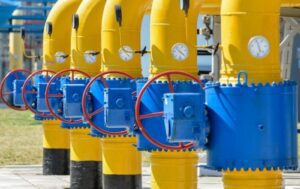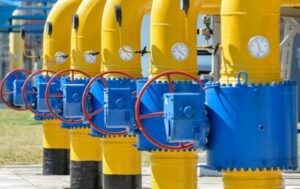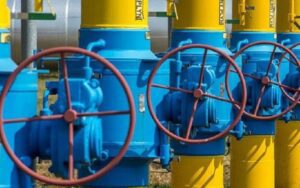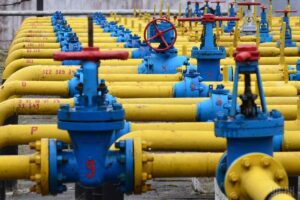
The operator of the GTS of Ukraine (OGTSU) reports on gross interference by representatives of Russia and illegal armed groups controlled by them, the so-called. “LNR” in the operational work and technological processes of gas transportation through the compressor station (CS) “Novopskov” in the Luhansk region.
“The Novopskov CS is an important facility for organizing gas transportation to consumers in the Donetsk and Luhansk regions. Almost a third of the transit to Europe from the Sokhranivka gas measuring station (GIS) also passes through this station,” the OGTSU said on Friday.
According to it, a number of actions by the occupiers were recorded, providing for changes in the operation of communication equipment and technological modes, which in fact could lead to the loss of operational control over the CS equipment.
“This will lead to significant risks to the integrity of the gas transmission system, the stability of gas transportation regimes, and as a result, the impossibility of transporting gas through the CS, in particular, under a transit contract,” the GTS Operator of Ukraine explained.
The Ukrainian company called on the representatives of the aggressor to refrain from further pressure on its employees and interference in the work of the Constitutional Court.
“Otherwise, in case of loss of operational control, the OGTSU will be forced to stop the operation of this facility in order to maintain the integrity and safe operation of the GTS. Stopping the Novopskov CS means stopping transit through the Sokhranovka GIS. Responsibility for the consequences lies with the Russian Federation,” – emphasized in the message.
On April 6, OGTSU Director General Sergey Makogon said that since the beginning of the war unleashed by Russia, three main gas pipelines have been damaged, four compressor stations have been seized by the invaders, two gas distribution stations (GDS) have been destroyed, and another 48 GDS have been stopped.

Capacity utilization of Ukraine’s transit corridor on Friday remains at the same high level, in line with the long-term contract volumes of 40 billion cubic meters per year or 109 million cubic meters per day.
European buyers have increased nominations for Gazprom’s gas after prices soared due to the imposition of sanctions on Russia. Gas prices at the TTF hub were $1,383 per thousand cubic meters on Friday morning.
“Gazprom is supplying Russian gas for transit via Ukraine as scheduled in accordance with the requests of European consumers – 109.5 mcm on March 11,” the company’s official spokesperson Sergey Kupriyanov told reporters.
As confirmed by data from the Ukrainian GTS Operator, the nomination for March 11 is 109.4 mcm, while that for March 10 was also 109.4 mcm.

The first published nomination for gas transit across Ukraine on March 2 is 108.8 million cubic meters, according to Gas Transmission System Operator of Ukraine data.
In other words transit capacity utilization will again be high. The nomination is adjusted throughout the day and that for Monday is currently 109.3 mcm.
European buyers have requested more gas from Gazprom after sanctions against Russia sent gas prices soaring: gas is trading at $1,332 per thousand cubic meters at the TTF hub.

Ukraine should remain a gas transit country, President of the European Commission Ursula von der Leyen said at a press conference in Kyiv.
“It is clear and constant for the European Commission Ukraine is and must remain reliable gas transit country,” the European Commission’s president said.

From September 20, transit through Ukraine within 48 hours will be possible without self-isolation, installation of the application “Vdoma” and testing, according to the State Border Guard Service of Ukraine.
Thus, in order to prevent the spread of acute respiratory disease COVID-19 caused by the coronavirus SARS-CoV-2 in Ukraine, the resolution of the Cabinet of Ministers of Ukraine of September 13, 2021 No. 954 amended the resolution of December 9, 2020, No.1236.
“Foreigners and stateless persons who enter Ukraine for transit and have documents confirming departure from the country within 48 hours, are released from self-isolation, installation of the application ‘Vdoma’ and testing in Ukraine,” a statement on the Facebook page of the State Border Guard Service said on Wednesday.
The agency reported that the need to have an insurance policy (certificate) issued by an insurance company registered in Ukraine, covering the costs of treatment COVID-19, observation, and is valid for the entire period of stay in Ukraine, remains unchanged for all foreign citizens and holders of a residence permit, regardless of the country of arrival to enter Ukraine.
All foreign citizens, holders of a residence permit, as well as stateless persons must have one of these documents upon arrival in Ukraine.
In particular, a document confirming the receipt of one or more doses of the vaccine against COVID-19, included by WHO in the list of permitted for use in emergencies; or a foreign COVID certificate confirming vaccination against COVID-19 with vaccines that are included by WHO in the list of permitted for use in emergencies, a negative result of testing for COVID-19 by PCR or recovery of a person from COVID-19; or a negative PCR test or rapid test for SARS-CoV-2 coronavirus antigen performed no more than 72 hours before entry.
Certificates of testing and vaccination are not required for children under 12 years of age.
“Foreign citizens over the age of 18 who have not been vaccinated against coronavirus and cross the state border for entry must have a negative test result and install a mobile application ‘Vdoma’ egardless of the length of stay in Ukraine,” the State Border Guard Service said.
Self-isolation is not used if PCR testing or rapid antigen testing is performed within 72 hours of entry and a negative result is obtained.
The decision comes into force on September 20, 2021.

Russia has no intention of halting gas transit through the territory of Ukraine following the launch of the Nord Stream 2 pipeline, Russian Foreign Ministry spokesperson Maria Zakharova said on Thursday.
However, this issue depends on the volumes of future European procurement and the competitiveness of alternative routes, Zakharova said.
“We are ready to continue gas transit through the territory of Ukraine, but this issue is purely a commercial one,” Zakharova told a press briefing in Moscow.
It “depends on many factors, including the volumes of future European procurement and the competitiveness of alternative routes,” she said.
Besides, speaking about attempts to link the start of the normal operation of Nord Stream 2 to “other subjects,” Zakharova said Moscow “continues to regard them as an example of absolutely illegitimate politicization of energy cooperation, which radically contradicts market principles.”